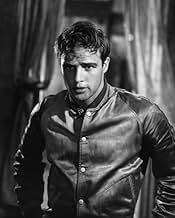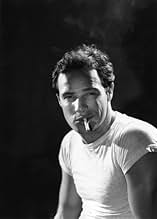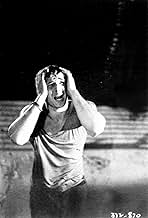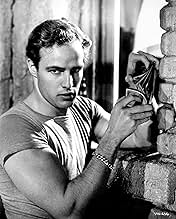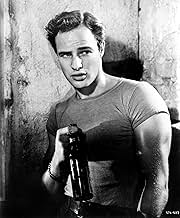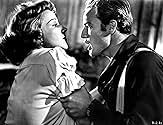Disturbed Blanche DuBois moves in with her sister in New Orleans and is tormented by her brutish brother-in-law while her reality crumbles around her.Disturbed Blanche DuBois moves in with her sister in New Orleans and is tormented by her brutish brother-in-law while her reality crumbles around her.Disturbed Blanche DuBois moves in with her sister in New Orleans and is tormented by her brutish brother-in-law while her reality crumbles around her.
- Won 4 Oscars
- 22 wins & 15 nominations total
James Adamson
- Extra
- (uncredited)
Irene Allen
- Extra
- (uncredited)
Mel Archer
- Foreman
- (uncredited)
Walter Bacon
- Club Patron
- (uncredited)
Dahn Ben Amotz
- Minor Role
- (uncredited)
Featured reviews
A dramatic and disturbing film based on Tennessee Williams's play . It deals with the tarnished Blanche DuBois (Vivien Leigh is unforgettable as a fading southern belle) who moves to live in New Orleans with her sister, Stella (Kim Hunter) , but there things go wrong when she meets her brutish , heavy-drinking brother-in-law, Stanley Kowalski (a sweaty , animalistic Marlon Brando , a role who shot him to superstardom) in his rattrap New Orleand apartment . As Blanche is a sexually disturbed woman who lives in a world of illusion . Her world starts to crumble when she moves in with her sister, as circumstances become unbearable when rumors of Blanche's dark past begin knowing among neighbors and then the happenings go awry ...When she got there she met the brute Stan, and the side of New Orleans she hardly knew existed. The Pulitzer Price Play of New Orleans' Latin Quarter...of a Lonely Girl...of Emotions Gone Savage!... Blanche, who wanted so much to stay a lady... Warner Bros. Bring the screen all the fire of A Streetcar Named Desire.
Well-deserved Academy Awards were garnered by Vivien Leigh as main actress , while Kim Hunter and Karl Malden won as secondary actors, providing all of them terrific and hypnotic qualities on their extraordinary interpretations . The excellent production design is first-rate , being competently set in the French Quarter of New Orleans during the restless years following World War Two . Main and support cast are frankly magnificent delivering excellent interpretation. Vivien Leigh is awesome as a fragile and neurotic woman who has suffered a series of calamities in her thunderous life . Marlon Brando gives a terrific acting as the abusive ,sinewy , brutish brother-in-law who believes to live under Louisiana's Napoleonic code what belongs to the wife belongs to the husband. They're very well accompanied by a great support cast , such as : Kim Hunter , Karl Malden , Rudy Bond and Nick Dennis. However , one reservation , all the roles are just fairly unbelieable and really exaggerated with the exception for Kim Hunter.
The motion picture was stunningly directed by Elia Kazan and considered to be one of the best films of the year , as he said it was one of his favorites of all the movies he made . Although gloomy and sordid throughout A Streetcar Named Desire fascinates rather than alienates the audience , thanks to the unpredictability of the play and riveting art decoration and set decoration that were both also rewarded with Academy Awards. During his long career, Kazan won two Oscars as Best Director and received an Honorary Oscar, won three Tony Awards, and four Golden Globe Awards. Kazan directed four performers to Best Actress Oscars: Celeste Holm, Kim Hunter, Eva Marie Saint and Jo Van Fleet. Greek-Turkish director Elia Kazan who being a child emigrated along with his family to United States made magnificent films . Some of them describe memories , emotions and infancy images , narrating the persecution to Greeks and Armenians by Turkish that finished in genocide as in ¨America , America¨ . Kazan directed a string of successful films as ¨Gentleman's agreement¨, ¨Man on a tightrope¨, ¨panic in the streets¨, ¨Pinky¨ , ¨Splendor in the grass¨, ¨Baby doll¨, ¨the engagement¨, ¨a Street named desire¨, ¨East of Eden¨ and especially his greatest hit : ¨On the waterfront¨ , the latter includes biographic elements ; in fact, Kazan worked in this waterfront area in 1934 during the height of the Great Depression .
There are other versions , but roughly inferior , based on the classic play by Tennessee Williams titled ¨A Streetcar Named Desire¨ , such as : 1984 by John Erman Ann-Margret as Blanche DuBois , Treat Williams as Stanley Kowalski and Beverly D'Angelo as Stella DuBois Kowalski. And 1995 rendition by Glenn Jordan with Jessica Lange , Alec Baldwin , Diane Lane , Randy Quaid and John Goodman.
Well-deserved Academy Awards were garnered by Vivien Leigh as main actress , while Kim Hunter and Karl Malden won as secondary actors, providing all of them terrific and hypnotic qualities on their extraordinary interpretations . The excellent production design is first-rate , being competently set in the French Quarter of New Orleans during the restless years following World War Two . Main and support cast are frankly magnificent delivering excellent interpretation. Vivien Leigh is awesome as a fragile and neurotic woman who has suffered a series of calamities in her thunderous life . Marlon Brando gives a terrific acting as the abusive ,sinewy , brutish brother-in-law who believes to live under Louisiana's Napoleonic code what belongs to the wife belongs to the husband. They're very well accompanied by a great support cast , such as : Kim Hunter , Karl Malden , Rudy Bond and Nick Dennis. However , one reservation , all the roles are just fairly unbelieable and really exaggerated with the exception for Kim Hunter.
The motion picture was stunningly directed by Elia Kazan and considered to be one of the best films of the year , as he said it was one of his favorites of all the movies he made . Although gloomy and sordid throughout A Streetcar Named Desire fascinates rather than alienates the audience , thanks to the unpredictability of the play and riveting art decoration and set decoration that were both also rewarded with Academy Awards. During his long career, Kazan won two Oscars as Best Director and received an Honorary Oscar, won three Tony Awards, and four Golden Globe Awards. Kazan directed four performers to Best Actress Oscars: Celeste Holm, Kim Hunter, Eva Marie Saint and Jo Van Fleet. Greek-Turkish director Elia Kazan who being a child emigrated along with his family to United States made magnificent films . Some of them describe memories , emotions and infancy images , narrating the persecution to Greeks and Armenians by Turkish that finished in genocide as in ¨America , America¨ . Kazan directed a string of successful films as ¨Gentleman's agreement¨, ¨Man on a tightrope¨, ¨panic in the streets¨, ¨Pinky¨ , ¨Splendor in the grass¨, ¨Baby doll¨, ¨the engagement¨, ¨a Street named desire¨, ¨East of Eden¨ and especially his greatest hit : ¨On the waterfront¨ , the latter includes biographic elements ; in fact, Kazan worked in this waterfront area in 1934 during the height of the Great Depression .
There are other versions , but roughly inferior , based on the classic play by Tennessee Williams titled ¨A Streetcar Named Desire¨ , such as : 1984 by John Erman Ann-Margret as Blanche DuBois , Treat Williams as Stanley Kowalski and Beverly D'Angelo as Stella DuBois Kowalski. And 1995 rendition by Glenn Jordan with Jessica Lange , Alec Baldwin , Diane Lane , Randy Quaid and John Goodman.
10Rathko
There is little to be said about this movie that thousands of critics have not stated already. It is a magnificent piece of cinema, with an intricate script delivered by actors at the peak of their talents. Leigh is unbearably brittle and fragile and she dances precariously on the edge of sanity. Marlon Brando embodies a sense of brooding masculinity that other men can only dream of attaining, while creating an enduring cinema icon and delivering one of the all-time great movie lines. From the raucous jazz score to the sleazy production design bathed in smoldering grey, 'Streetcar' is a class-act from beginning to end; sexy, brutal, and endlessly fascinating.
"Streetcar Named Desire" is an exceptional film, thanks to three essential components: (1) the superb acting ability of its two leads, Vivien Leigh and Marlon Brando, as well as that of the supporting cast, small in number but huge in its combined dramatic power, (2) an excellent screenplay by the original playwright, Tennessee Williams, that is packed from beginning to end with explosive, conflict driven dialogue, and (3) the brilliant direction of Elia Kazan who so skillfully brings the play to the screen.
In its legendary opening, Blanche DuBois (Vivien Leigh) emerges from a cloud of locomotive smoke and is helped onto a streetcar by a perfect stranger, a sailor. This simple act neatly ties the film's beginning to Blanche's final, heartbreaking line, "I have always depended upon the kindness of strangers". She, as the central character, is lost in the big city, and she becomes more and more hopelessly adrift in the world as the film approaches its very tragic end.
Broke and friendless, Blanche lands in New Orleans where her sister, Stella (Kim Hunter) lives with her coarse, crude husband, Stanley Kowalski (Brando). Having lost her ancestral home on account of family-related debt and having been dismissed under vague circumstances from her position as a high school English teacher in the small Mississippi town from where she came, she has no other place to go at a time of dire need.
Although Stella is genuinely concerned about Blanche's declining physical and mental state, the shabby apartment where she lives with Stanley consists of two small rooms, barely enough space for the Kowalskis even without Stanley's regular poker group, which seems to park itself there at every available opportunity. What makes matters worse is Stanley's loud and boisterous personality. From the start, Stanley resents the presence of Blanche, which he views as an unwanted, disruptive invasion of his marriage and his home. He regards her with total distrust and disdain. Another reviewer here interpreted this as a cultural clash between the old and the new South, and I think that is a very astute observation. In any case, Stanley is totally unsympathetic to Blanche's plight and looks upon her with nothing but suspicion and contempt.
Blanche is trapped in the claustrophobic and confining prison of the dingy Kowalski apartment. For one, fleeting moment, she believes that Mitch (Karl Malden), Stanley's poker buddy and co-worker, stands as her one bright hope of liberation from the walls that continue to close around her, but he turns out to be anything but her desperately needed "knight in shining armor". Tragically, Mitch, a weak individual who is still dominated by a strong mother well into his adulthood, is the last person with the ability to give Blanche the love and strength that she so urgently needs and to whisk her away from the stifling, debilitating atmosphere of the Kowalski dungeon. Blanche's one, last hope for personal redemption soon fades away forever.
I read that, under different circumstances, the lead roles could have been awarded to Olivia de Haviland and John Garfield. As much as I like them both, this would have been a much different movie with them as the leads. Ms. Leigh, a stunning Englishwoman who managed to score two Oscars for playing two iconic, southern American characters, portrays a mentally declining Blanche with great depth and compassion. As to Mr. Brando's brutish and obnoxious Stanley, you've got to see him in action to appreciate his magnificent performance. As in the case of his Terry Malloy in "On the Waterfront", I don't believe that Stanley's most famous lines from this film would be among the most imitated to this day if they weren't delivered so dynamically by Brando in the first place. "Hey, Stel-la!" Sorry. I just couldn't help myself.
While Brando was beaten out of the Oscar by Humphrey Bogart in "African Queen" (not my favorite Bogey movie by a long shot), Leigh, Malden, and Hunter swept the awards for their performances here and deservedly so. The memorable role of feisty neighbor Eunice also launched Pat Hillias's successful career throughout the golden age of television during the 1950's until her tragic and untimely death in 1960.
If you want to watch an unforgettable rendering of a strong, intense script that is worthy of such a talented cast and director, don't miss this one.
In its legendary opening, Blanche DuBois (Vivien Leigh) emerges from a cloud of locomotive smoke and is helped onto a streetcar by a perfect stranger, a sailor. This simple act neatly ties the film's beginning to Blanche's final, heartbreaking line, "I have always depended upon the kindness of strangers". She, as the central character, is lost in the big city, and she becomes more and more hopelessly adrift in the world as the film approaches its very tragic end.
Broke and friendless, Blanche lands in New Orleans where her sister, Stella (Kim Hunter) lives with her coarse, crude husband, Stanley Kowalski (Brando). Having lost her ancestral home on account of family-related debt and having been dismissed under vague circumstances from her position as a high school English teacher in the small Mississippi town from where she came, she has no other place to go at a time of dire need.
Although Stella is genuinely concerned about Blanche's declining physical and mental state, the shabby apartment where she lives with Stanley consists of two small rooms, barely enough space for the Kowalskis even without Stanley's regular poker group, which seems to park itself there at every available opportunity. What makes matters worse is Stanley's loud and boisterous personality. From the start, Stanley resents the presence of Blanche, which he views as an unwanted, disruptive invasion of his marriage and his home. He regards her with total distrust and disdain. Another reviewer here interpreted this as a cultural clash between the old and the new South, and I think that is a very astute observation. In any case, Stanley is totally unsympathetic to Blanche's plight and looks upon her with nothing but suspicion and contempt.
Blanche is trapped in the claustrophobic and confining prison of the dingy Kowalski apartment. For one, fleeting moment, she believes that Mitch (Karl Malden), Stanley's poker buddy and co-worker, stands as her one bright hope of liberation from the walls that continue to close around her, but he turns out to be anything but her desperately needed "knight in shining armor". Tragically, Mitch, a weak individual who is still dominated by a strong mother well into his adulthood, is the last person with the ability to give Blanche the love and strength that she so urgently needs and to whisk her away from the stifling, debilitating atmosphere of the Kowalski dungeon. Blanche's one, last hope for personal redemption soon fades away forever.
I read that, under different circumstances, the lead roles could have been awarded to Olivia de Haviland and John Garfield. As much as I like them both, this would have been a much different movie with them as the leads. Ms. Leigh, a stunning Englishwoman who managed to score two Oscars for playing two iconic, southern American characters, portrays a mentally declining Blanche with great depth and compassion. As to Mr. Brando's brutish and obnoxious Stanley, you've got to see him in action to appreciate his magnificent performance. As in the case of his Terry Malloy in "On the Waterfront", I don't believe that Stanley's most famous lines from this film would be among the most imitated to this day if they weren't delivered so dynamically by Brando in the first place. "Hey, Stel-la!" Sorry. I just couldn't help myself.
While Brando was beaten out of the Oscar by Humphrey Bogart in "African Queen" (not my favorite Bogey movie by a long shot), Leigh, Malden, and Hunter swept the awards for their performances here and deservedly so. The memorable role of feisty neighbor Eunice also launched Pat Hillias's successful career throughout the golden age of television during the 1950's until her tragic and untimely death in 1960.
If you want to watch an unforgettable rendering of a strong, intense script that is worthy of such a talented cast and director, don't miss this one.
... of two powerhouse juggernauts. Absolutely dripping with tension, acrimony and bitterness as Blanche DuBois and Stanley Kowalski lock horns in their own uniquely individual way with the backdrop a dark, drenched and run down part of New Orleans. Coupled with a pair of superb supporting performances that amplify and escalate the whole to a unique plateau, you'll feel as though you've been run down by an out of control steam train, flattened by a steamroller to be reformed in a furnace fuelled by fear, frustration and desire.
Blanche Dubois arrives in the French Quarter of New Orleans suffering from a mental tiredness brought on by a series of financial problems that have ended in the family losing their plantation. She has come to stay with her sister, Stella and her husband Stanley Kowalski in their serviceable little apartment. The aggressive and animalistic Stanley immediately marks himself as the opposite of the feminine and refined Blanche and Stella finds herself pulled between the two of them. Stanley suspects all is not as it seems and begins to pry into Blanche's colourful past, even as Blanche spots a way out in the arms of the Mitch, a man captivated by her. However it doesn't take long before the cracks begin to show in the relationships and in Blanche herself.
It almost goes without saying that the writing here is of top-notch quality. The story is a relatively simple character piece that can be summed up in a couple of sentences, however this would do a great injustice to the depth of development and the convincing manner in which the characters are all written and the story told. It is not so much the depth that some of the characters go to, but the complexity that is effortlessly written into them we can see it writ large on them, but not to the point where it seems obvious or uninteresting. Blanche is of course the focus and she is a mess of neurosis barely hidden behind a front of respectability that clearly doesn't convince her anymore than it does Stanley. Mitch is also really well written at first it is comic that he tries to be such a gentleman while having the brute just under the surface, but later his frustration is heavy on his face along with his anger. The overall story is surprisingly, well, "seedy" is the best word that comes to mind. It is in the gutter and no matter what Blanche wants to believe, that is where it stays and the film is right there the whole time.
How Kazan managed it in the early fifties is beyond me, because even now the film is pretty graphic in its violence to women, subject matter and rippling sexuality across pictures and characters. It is a compelling story due to the characters and the manner in which they are delivered Kazan's atmospheric direction really helps; the films feels humid and close, and he has done it all with a basic set and a camera. The lighting throughout is wonderful both in the general atmosphere but also specific touches such as the way Blanche manages to visibly age due to lighting changes when the film has slight chances of tone.
Of course the main reason I keep coming back to this wonderful film is the actors, who take the opportunity and, in many cases, make it so that it is hard to see anyone else playing their roles. Leigh is perfect for the role and gets everything absolutely spot on; she is vulnerable yet self-seeking, confident yet needy, proper yet unstable. Even visually Leigh is convincing in terms of body language but also the fact that she looks the right mix of ages, looking beautiful one moment but worn and defeated the next totally, totally deserved her Oscar. Brando made his name here and even now his performance is electrifying and memorable. He has his big scenes where he gets to play to the back row but he also has moments where he does nothing other than be a presence on screen; no matter what is going on we are watching him because we are as in awe and yet as afraid of his power as Blanche is herself. Together Leigh and Brando dominate the screen and whenever either of them are on screen it is hard to look away. As a result, Kim Hunter sort of gets lost in the background although her performance is still good. Karl Madden is great but again only holds a supporting role and deserved his Oscar for a convincing performance of a well-written character. Of course it is easier to give good performances with great material than with bad material but there have been enough versions of this play around for us to see how lesser actors can fail where this cast soared.
Overall this is a great film that sees so many critical aspects all coming together as one final product. A superb play has undergone a great adaptation that has been seized upon a great cast who deliver a collection of performances that deserve all the praise heaped on them, all directed with a real sense of atmosphere that really delivers a seedy and erotic film both for its time and today. I cannot think of an excuse for people not having seen this film.
It almost goes without saying that the writing here is of top-notch quality. The story is a relatively simple character piece that can be summed up in a couple of sentences, however this would do a great injustice to the depth of development and the convincing manner in which the characters are all written and the story told. It is not so much the depth that some of the characters go to, but the complexity that is effortlessly written into them we can see it writ large on them, but not to the point where it seems obvious or uninteresting. Blanche is of course the focus and she is a mess of neurosis barely hidden behind a front of respectability that clearly doesn't convince her anymore than it does Stanley. Mitch is also really well written at first it is comic that he tries to be such a gentleman while having the brute just under the surface, but later his frustration is heavy on his face along with his anger. The overall story is surprisingly, well, "seedy" is the best word that comes to mind. It is in the gutter and no matter what Blanche wants to believe, that is where it stays and the film is right there the whole time.
How Kazan managed it in the early fifties is beyond me, because even now the film is pretty graphic in its violence to women, subject matter and rippling sexuality across pictures and characters. It is a compelling story due to the characters and the manner in which they are delivered Kazan's atmospheric direction really helps; the films feels humid and close, and he has done it all with a basic set and a camera. The lighting throughout is wonderful both in the general atmosphere but also specific touches such as the way Blanche manages to visibly age due to lighting changes when the film has slight chances of tone.
Of course the main reason I keep coming back to this wonderful film is the actors, who take the opportunity and, in many cases, make it so that it is hard to see anyone else playing their roles. Leigh is perfect for the role and gets everything absolutely spot on; she is vulnerable yet self-seeking, confident yet needy, proper yet unstable. Even visually Leigh is convincing in terms of body language but also the fact that she looks the right mix of ages, looking beautiful one moment but worn and defeated the next totally, totally deserved her Oscar. Brando made his name here and even now his performance is electrifying and memorable. He has his big scenes where he gets to play to the back row but he also has moments where he does nothing other than be a presence on screen; no matter what is going on we are watching him because we are as in awe and yet as afraid of his power as Blanche is herself. Together Leigh and Brando dominate the screen and whenever either of them are on screen it is hard to look away. As a result, Kim Hunter sort of gets lost in the background although her performance is still good. Karl Madden is great but again only holds a supporting role and deserved his Oscar for a convincing performance of a well-written character. Of course it is easier to give good performances with great material than with bad material but there have been enough versions of this play around for us to see how lesser actors can fail where this cast soared.
Overall this is a great film that sees so many critical aspects all coming together as one final product. A superb play has undergone a great adaptation that has been seized upon a great cast who deliver a collection of performances that deserve all the praise heaped on them, all directed with a real sense of atmosphere that really delivers a seedy and erotic film both for its time and today. I cannot think of an excuse for people not having seen this film.
Did you know
- TriviaAs the film progresses, the set of the Kowalski apartment actually gets smaller to heighten the suggestion of Blanche's increasing claustrophobia.
- GoofsWhen Stanley comes back from taking Stella to the hospital, he is looking for a bottle opener. He finds it on the mantelpiece, shakes up a bottle of beer, and opens it. The beer foams up and spills on his trousers. But if you watch at the moment when he swings himself up to sit on the table - before he opens the bottle - you can see that the front of his trousers are already wet. Apparently they re-shot it without him changing into dry trousers.
- Alternate versionsThe scene in which Blanche and Stanley first meet was edited a bit to take out some of the sexual tension that both had towards each other when the film was first released in 1951. In 1993, this footage was restored in the "Original Director's Version" of the film. The three minutes of newly-added footage sticks out from the rest of the film because Warner Brothers did not bother to restore these extra film elements along with the rest of the movie, leaving them very scratchy due to deterioration.
- ConnectionsEdited into Un Américain nommé Kazan (2018)
- SoundtracksIt's Only a Paper Moon
(1933) (uncredited)
Music by Harold Arlen
Lyrics by E.Y. Harburg and Billy Rose
Sung by Vivien Leigh while doing her hair
Details
- Release date
- Country of origin
- Languages
- Also known as
- Un tranvía llamado Deseo
- Filming locations
- New Orleans, Louisiana, USA(railway station)
- Production companies
- See more company credits at IMDbPro
Box office
- Budget
- $1,800,000 (estimated)
- Gross worldwide
- $54,695
- Runtime2 hours 2 minutes
- Color
- Aspect ratio
- 1.37 : 1
Contribute to this page
Suggest an edit or add missing content







